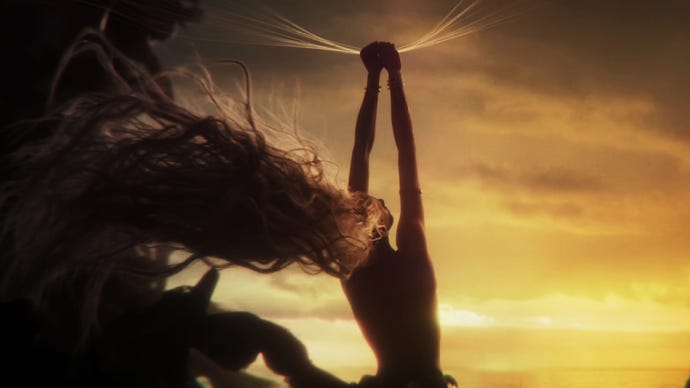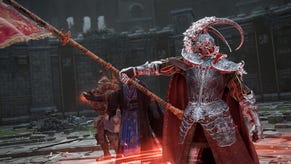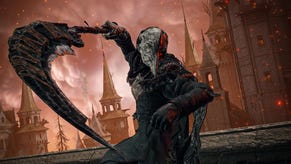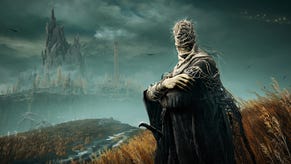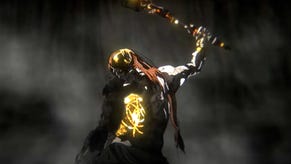Shadow of the Erdtree finally lifted the veil on one of Elden Ring’s biggest mysteries, and it’s properly mind-blowing
He gets: Godhood. You get: Everything taken away
Elden Ring loves its mysteries. Strange gods, forbidden unions, an unknown vow between brothers that changes the fate of the world. At the center of all this, and Elden Ring itself, is the biggest mystery and the game’s most important character: Marika. Despite her significance, she’s the only character you never really meet and who never speaks for herself. It’s a bizarre state of affairs, considering this goddess-queen forced an entire world to submit to her rule and created an entire new religion with herself at the center.
I assumed the Marika mystery was just FromSoftware doing its usual thing of intentionally leaving narrative threads unfinished, but once I finished Shadow of the Erdtree, I realized that wasn’t the case. Marika’s erasure was intentional – and I think it drives Elden Ring’s entire plot.
Full end-game spoilers for Elden Ring, and Shadow of the Erdtree, follow.Once upon a time, Marika was a very corporeal being, a ferocious warrior, and a capable sorceress. She swept into The Lands Between and brought it under her control, launched a crusade against the dragons, the ancient giants, and eventually, the people who stuffed her family into meat-grinder jars. She established herself at the head of a new social order. The important thing to note here is that she did this. Yes, Godfrey, her first lord, tagged along for the ride )and did lots of killing) but Marika was the force behind it all, the one who made contact with gods and brought ancient orders to ruin.
It wasn’t enough. She wanted more, and of course she did. Vicious, vengeful, cruel to her children she might be, but Marika is also an ambitious, restless woman who reached the top and wondered how to go higher. The problem is, I don’t think she considered the fact that Radagon was just as ambitious.
The Shadow of the Erdtree story trailer mentions seduction, betrayal, and an “affair from which Gold arose,” while showing what looks like the first time someone used the Gates of Divinity. Seduction and affair are loaded words, and it’s probably safe to assume Marika and Radagon became very friendly, perhaps before Marika exiled Godfrey. However, I think there’s a second meaning at play here, especially since those words play out as probably-Marika pulls some gold threads out of what’s also probably her corpse before offering herself at the gates.

The lure of power and godhood seduced Marika, and the affair was something much more than just a mingling of bodies. There’s no reason why Marika couldn’t have kept Radagon as her lover and stayed married to Godfrey – unless Radagon agreed to something Godfrey couldn’t or wouldn’t: ascension.
One of Elden Ring’s most confusing plot points is Marika herself. Or, more specifically, what the heck’s going on with her and Radagon. The Corhyn side quest makes a big deal out of her and Radagon being the same person. It’s a shocking revelation for him, and for us, but Shadow of the Erdtree casually blows the mystery wide open when Miquella fuses with Radahn. The only way to become a god in Elden Ring is for a consort and the soul of an Empyrean to become one being.
If that sounds farfetched or Shadow-specific, bear in mind it’s essentially what Ranni does with you in her ending. She casts her body aside, becomes a spirit, makes you her consort, and ushers in the age of the moon as The Lands Between’s new god.
The downside though, as St. Trina tells us, is that the Empyrean’s life becomes a prison that only death can free them from.
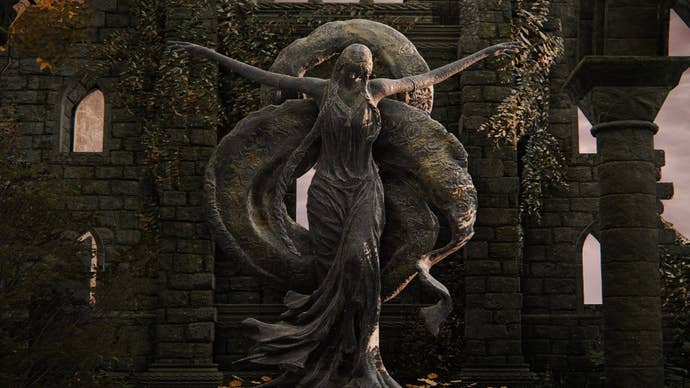
In Marika’s case, I’m reminded of Emily Bronte’s Wuthering Heights. Bear with me. In that fantastic gothic novel, Catherine Earnshaw falls passionately in love with a nobody named Heathcliffe, but has her eyes on a fancier prize: status. She decides to marry a local landowner and aristocrat and evicts Heathcliffe from her soul, and the life she chose eventually suffocates her until all that remains is a withered husk.
Elden Ring doesn’t say so explicitly or implicitly, but few viable explanations exist for Marika’s sudden decision to expel Godfrey. After hearing St. Trina’s words about Miquella, I can easily see Godfrey – if he has any affection for Marika at all – refusing to condemn her to the same prison that awaited Miquella, and Marika yeeting him in to the sun to find someone who would become her consort for this strange ritual.
One popular fan theory is that Marika took grace from Godfrey and his followers as part of some plan against the Greater Will, but I don’t buy it. For starters, Marika throws herself into the order she created after banishing Godfrey and ascends to godhood. Maybe it was some long-term failsafe in case things went sour with Radagon, but that seems like a bit of a stretch. The Tarnished cling to Marika’s words at her churches – that they would return after death, full of grace, to “brandish the Elden Ring” – but there’s no mass return of the dead to The Lands Between. They just trickle back in, die, and fade into memory.
I think there’s a more practical explanation for her words, though. Marika just demoted, divorced, and exiled the beloved leader of a large and aggressive military unit. That’s not the kind of enemy you want for your new regime, so the best thing to do is to placate them and send them far, far away where they won’t be a nuisance – which is exactly what Marika does.
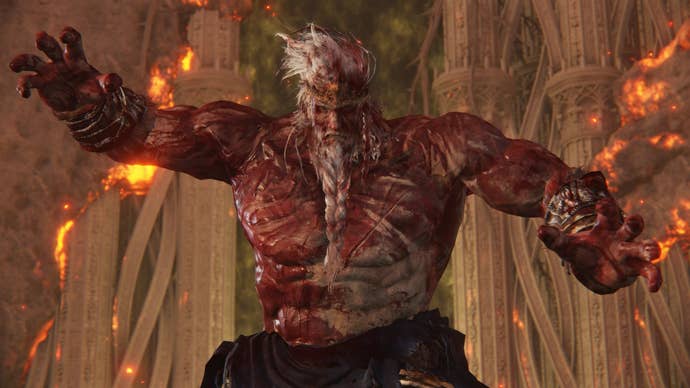
Or maybe Godfrey was just p**sed off about Marika stuffing their Omen kids in the sewers and made such a fuss that Marika kicked him out. That’s a possibility, but there’s a lot less to go on with that line of thinking. Elden Ring loves its parallels, and Godfrey and Marika are a perfect mirror of St. Trina and Miquella.
But, whatever the reason behind Godfrey’s banishment, Marika gets married again – and everything changes.
With Radagon in tow, Marika travels through the war-torn Land of Shadow to Enir-Elim, sheds her mortal form (as Miquella would later do), and opens the Gates of Divinity. But unlike their son, Marika and Radagon actually finish the ritual. Going by what Miquella starts to initiate with Radahn, this is when Marika and Radagon become one person – and no, I don’t mean that in a ye olde sex way. I mean the consort and the Empyrean’s spirit merged into one being that remains that way until the end of the Golden Order. That’s how you get the anomaly of Marika ordering war on the sorcerers of Raya Lucaria from Leyndell, whilst Radagon led the charge. They were originally separate people – until Marika became a god.
As far as I can tell, Marika’s war on the Hornsent is her last battle, and she changes once she returns to The Lands Between – or is made to change. No longer is she Marika the ferocious warrior, conqueror of dragons and avenger of her people. She fades into a role women were forced in throughout most of history. She becomes a wife.
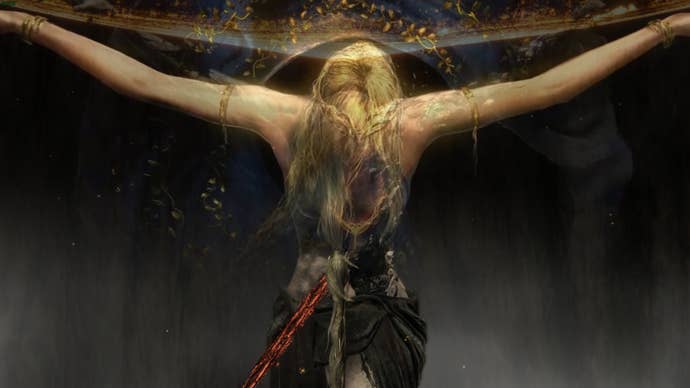
After her multilayered marriage to Radagon, the only role left for her is a passive one. Marika the goddess-queen is the embodiment of grace and Elden Ring’s Order, and the standard of belief and behavior everyone in that Order is meant to follow. She’s Radagon’s wife, her children’s mother, and the object of veneration across the land. To the Hornsent, she’s a “vile strumpet” (for understandable reasons, at this point). She’s the trinity of historical views of women: a mother, a saint, a whore – but no longer does any of the text in Elden Ring speak of her as a person; let alone one with any agency of her own.
Instead, she turns into an ideal. In her role as the upholder of order, she’s partly become that Victorian twaddle about women being a family’s and a nation’s moral compass. She’s the mother of all, extending grace to those who fit in the society she created and offering unchanging peace and security. She’s also partly, now, representative of the medieval European tendency to treat women as objects to revere and protect – instead of autonomous people with lives to live. Even Elden Ring’s opening cinematic gets in on the act. The queen is missing! Go save her, valiant knight!
Marika becomes what you, and others, think of her. Her existence is about using her to gain something for yourself, without even the faintest idea of what she might want, think, or need. By ascending to godhood, she’s lost herself. Meanwhile, Radagon – the one with an actual physical body still left in the physical realm – enjoys all the privileges of being alive, and a god, and does whatever he can to ensure this state of affairs continues.
Elden Ring is never clear about why or when the Shattering happened. The opening cinematic says Marika went missing before the war, which would suggest Marika busted the Elden Ring before Godwyn’s murder. Rogier says she did it after the Night of Black Knives, when Godwyn died. In Shadow of the Erdtree, Leda suggests “His Emminence” Miquella might’ve kicked off the Shattering as a contest to find a worthy lord for his consort. Maybe he charmed Marika into smashing the Elden Ring, or maybe he just incited war among his family after the act was done. What Marika did was such a powerful act of defiance that I think she just did it on her own, without interference from her snot-nosed magic son.
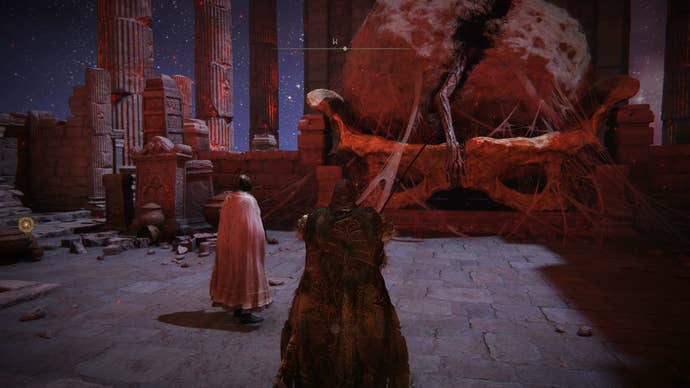
Whatever the cause, be it grief or frustration, Marika tore her life and everything she built apart on purpose. She’d had enough, and she didn’t care what the consequences would be. And who can blame her? In this line of thinking, her life shrank year after year, with no end in sight, and she eventually realizes her victories, sacrifices, and sins have all been for naught.
The Finger Readers tell us she was imprisoned as punishment for shattering the ring, but, in Elden Ring’s characteristic fashion of lying through omission, it wasn’t some random emissary of an Outer God who did it. It was Radagon. The thorns blocking you from entering the Erdtree – and blocking anyone from getting out – are shaped like his Rune.
Enia the Finger Reader’s vague explanation suggests the Greater Will punished Marika. However, she never actually says who did it. But think about it: Radagon is the one who stands to lose the most if Marika breaks free. He’s the reason she went missing.
With her final chance of freedom gone, Marika spends her last days imprisoned in her room, imprisoned in her body, and she fades into nothingness when you break Radagon’s seal and enter her chambers – the end of a life, a warrior, a mother, and a god. Radagon remains, but he’s such a decrepit shadow of his former self that it’s almost pathetic, or it would be if he weren’t trying to bash your brains out. Marika’s complete lack of movement makes me think she’s probably dead or near death at this point, and everything she worked for is in tatters. Even if Radagon were victorious against you, Tarnished, there’s no way the the pair could go back to anything resembling the way things were.
I think Godfrey knows this, hence the sudden influx of Tarnished – and Godfrey – himself returning to Leyndell. There’s no definitive answer to what Elden Ring is about, obviously, and there isn’t meant to be. But I like to think that, in some way at least, it carries on that Wuthering Heights parallel: Godfrey, unable to shake the specter of Marika from his mind, returns to take back what was rightly his, and wreak havoc on the remnants of her life’s work, but inadvertently creates a better world for those who came after in the process.
Well, until you murder him. Are we... are we the baddies?
